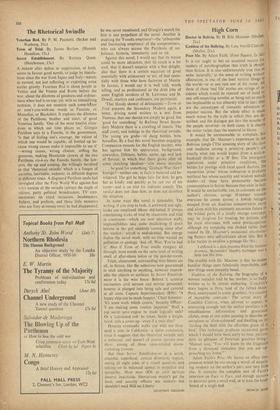High Corn
Goddess of the Bullring. By 1.01a Verrill Cintron- (Muller, 21s.) Poor Me. By Adam Faith. (Four Square. 2s.
Ii is (or ought to be) an accepted maxim for readers of autobiographies that truth is cornier than fiction. It is also unfortunately true that to write 'naturally,' in the sense of writing without affectation, is one of the least natural things in the world—or at any rate one of the rarest. All three of these 'real life' stories are strings of in- cidents which would be rejected out of hand by any self-respecting novelist as being not so much too implausible as too absurdly trite to use: they are the stereotypes of romantic adventure or popular success. But the whole effect is made much worse by the style in which they are de. scribed, and the dialogue put into the mouths ...)f the people involved--in both cases, it is clearly the writer rather than the material to blame.
It would be unreasonable to complain, for example. that Dr. Mautner's experiences in the Bolivian jungle ('The amazing story of life, loYe and medicine among a primitive people') are exactly what one would expect from a station' bookstall thriller or a 'B' film. The emergencY operations under primitive conditions,, the battles for prestige with local quack doctors, the mysteriobs 'priest' whose ordination is probably mythical but whose sanctity and wisdom nobodY doubts—all these have presumably become commonplace in fiction because they exist in fact. It would be uncharitable, too, to comment on the author's obvious. savage ill-temper towards everyone he comes across; a Jewish refugee, escaped from an Austrian concentration camp and alone with 'his extremely uncertain future in the, wildest paits of a totally strange continent, may be forgiven for treating his patients and his local mistresses with some preoccupation; although my sympathy was choked rather than roused by Dr. Mautner's occasional unconv nc- ing flutters into self-criticism about this. But it is far harder to swallow a passage like this : • I stiffened as a dark presence filled the barn doorway. Malvenidot Death's harbinger w: little late this time.
The trouble with Dr. Mautner is that he makes familiar things seem fabulously improbable, and new things seem instantly banal.
Goddess of the Bullring, the biography of woman matador told by her mother, is so badly written as to be almost endearing. 'Conchita's story begins in Peru, land of the fabled Incas. Peru, unsurpassed in scenic grandeur. is a country of incredible contrasts.' The actual story of Conchita Cintron, when allowed to appear, is interesting enough: but the author smothers it in miscellaneous information and gratuitous cliches, even at one point pausing to describe an aeroplane as 'silver-coloured' and dwelling on its 'circling the field with the effortless grace of 3 bird.' This technique produces occasional gems which I should have been sorry to miss, particu- larly its glimpses of Peruvian gracious living: 'Manuel said, "You will know by the fragrance from a thousand oleanders that you are ap- proaching my home."' Adam Faith's Poor Me leaves an effect inl- pression would be too strong a word) of surpris- ing modesty on the author's part, and very little else. It contains the complete text of Faith's interview on Face to Face, and enough pictures to decorate quite a small wall, or at least the head- board of a single bed. boo is a FRANCIS °PO










































 Previous page
Previous page